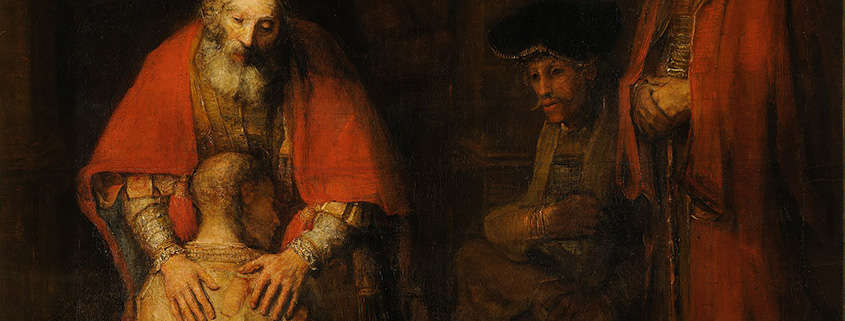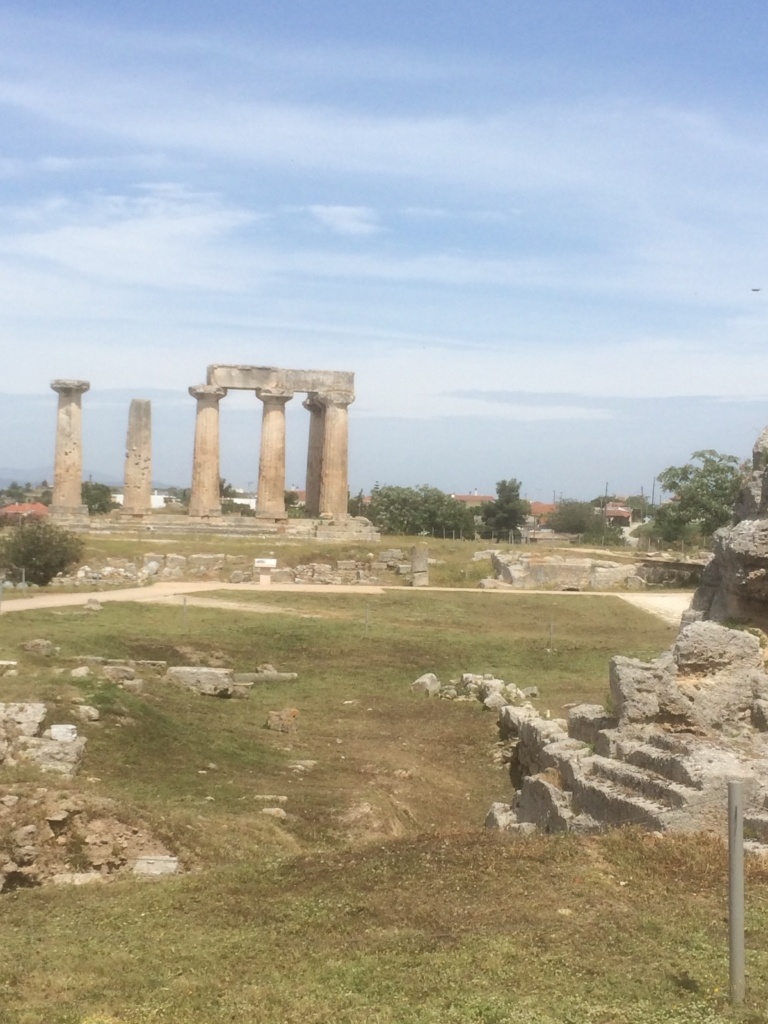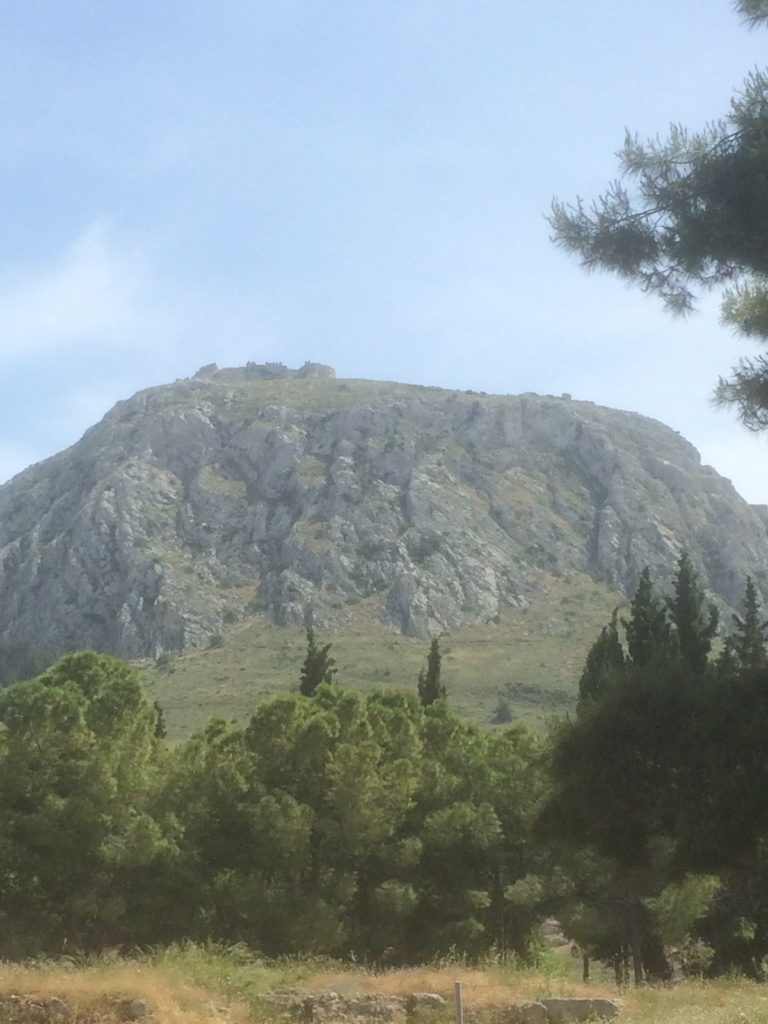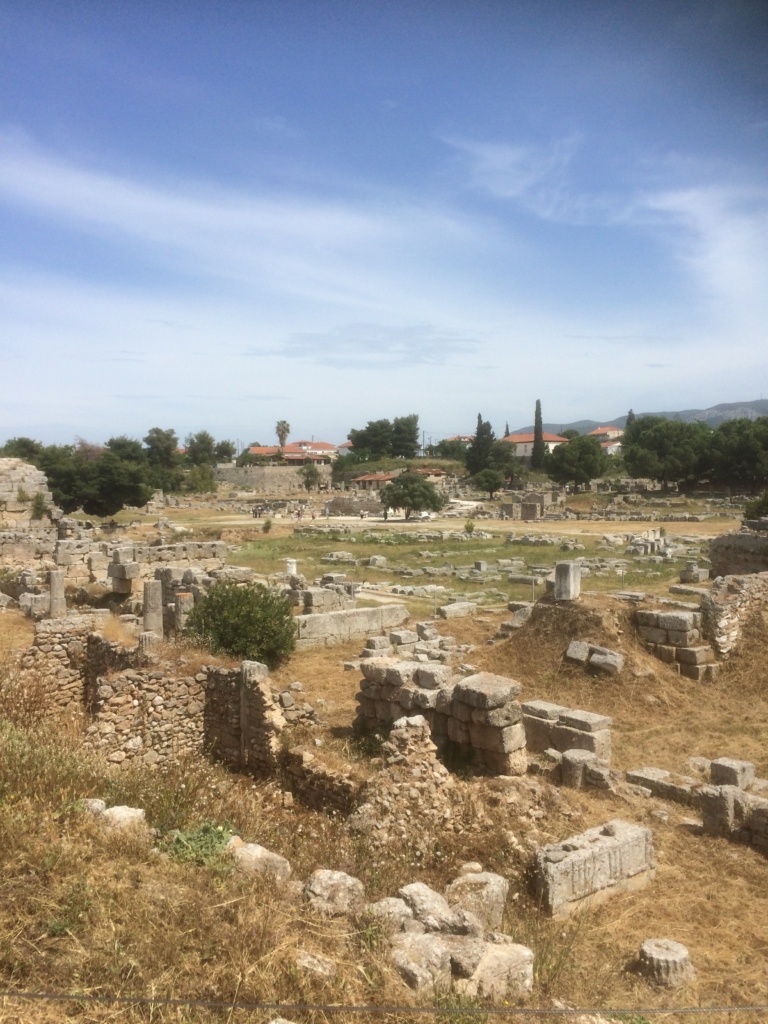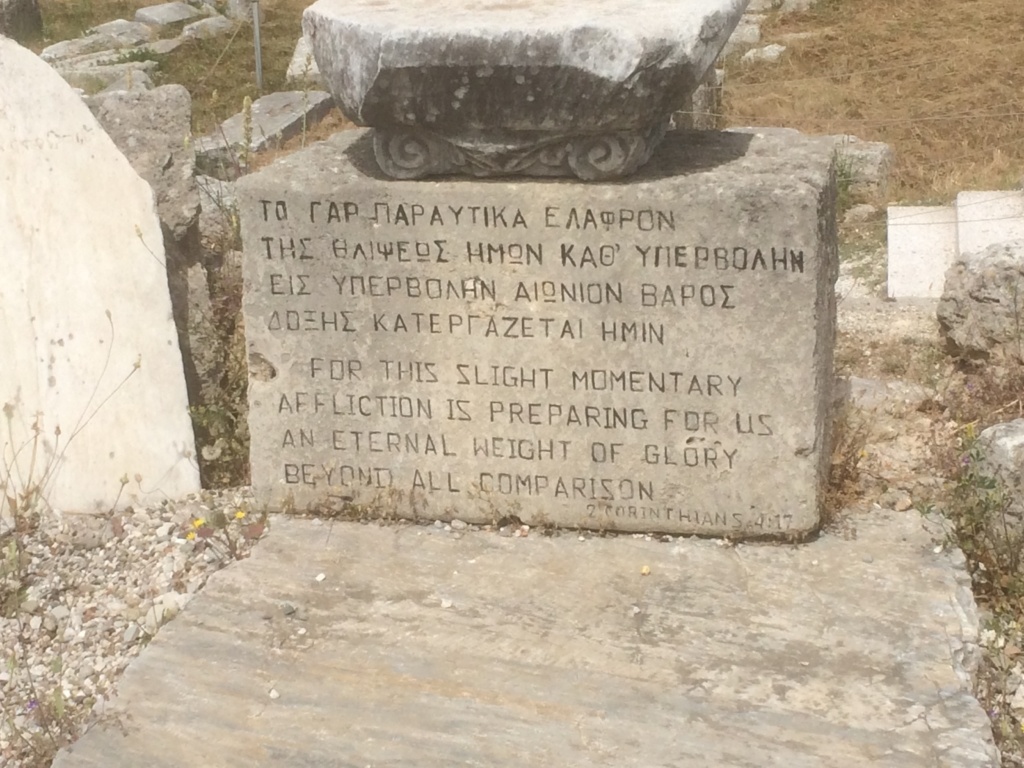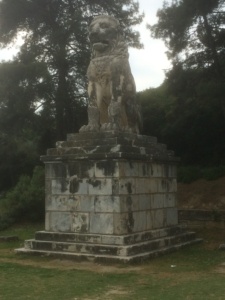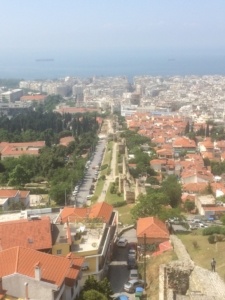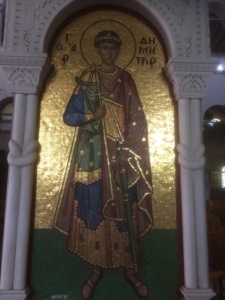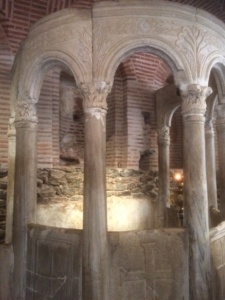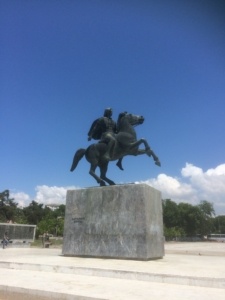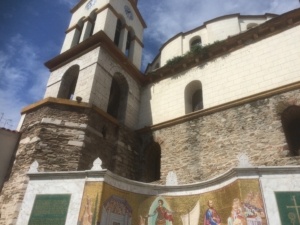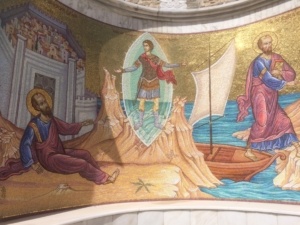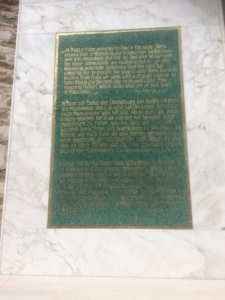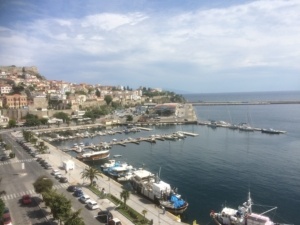All the way through the Acts of the Apostles the disciples are living out Luke 5. They continually put out into deep water, let down the nets and see what happens even in the most unlikely circumstances. +Steven traces part of that story over the course of four talks looking in turn at God’s mission in Macedonia, in Greece and in the great city of Ephesus. What lessons can we seek to learn as we turn our boats away from the shore to deep waters and let down the nets for a catch?
This page includes images and text by the Revd Janet Minkkinen of St Andrew’s Church Cippenham who is on pilgrimage. If you would prefer to watch +Steven teach this session, scroll to the bottom of this page for the video.
Session 1: Macedonia
The story of the spread of the Christian faith across the Roman world is a story full of surprises. It is a story of both suffering and joy. It is a story of human endeavour and God’s agency. It is a story to which the Church has returned again and again through two thousand years as we seek fresh inspiration in God’s mission. It is the story told by St. Luke both in the gospel and in his second book, the Acts of the Apostles.
In every era of the Church, Christians have turned to Luke’s great narrative to find renewal and to return to first principles. In the eighth century AD, the great English historian Bede bases his Ecclesiastical History on the Book of Acts. In the early twentieth century, the Anglo-Catholic theologian, Roland Allen reflects on the story of Christian mission in China in his seminal book: Missionary Methods, St. Paul’s our ours?. In the late twentieth century, the American Episcopalian priest Dennis Bennet turns to Acts to describe his experiences of God which were the beginnings of charismatic renewal in his book Nine O’clock in the Morning.
In these talks, I want to continue this tradition of reflection on the principles of Christian mission in Luke and Acts. We are reflecting together as a Diocese on what it means to be a Christ-like Church for the sake of God’s world: contemplative, compassionate and courageous. We have listened carefully to the kind of church we are called to be in the Beatitudes, in the story of the raising of Lazarus and in the Letter to the Colossians [you can find the common vision study guides on our online store].
We are now at the point where we are beginning to move forward in God’s mission together: to attempt new things in new ways for the sake of the kingdom of God. We are doing this as a single Diocese and also in our parishes, benefices and deaneries and in our schools and chaplaincies.
As we begin to act and to do new things, so this is a good moment to listen to the Book of Acts, as framed by Luke, and to find fresh inspiration for mission in our own day.
The Gospel of Luke
The Gospel of Luke is not simply Part One of a two-part work. The Gospel is the most important of the two volumes. The Gospel frames the story of the Church which follows. In particular, Luke sets the horizon for Christian mission in his gospel through two key passages set near the beginning of Jesus’ ministry. The first is in Luke 4, the second in Luke 5.
In Luke 4, Jesus comes to the synagogue in Nazareth and reads from the Book of Isaiah. You will know the passage:
“The Spirit of the Lord is upon me, because he has anointed me to bring good news to the poor. He has sent me to proclaim release to the captives and recovery of sight to the blind, to let the oppressed go free, to proclaim the year of the Lord’s favour” (Luke 4.18).
Jesus rolls up the scroll, hands it back to the attendant and sits down. “Then he began to say to them, “Today this scripture has been fulfilled in your hearing.” The horizon of Christian mission is set wide. The mission of Jesus is about the transformation of the whole world and the bringing in of the kingdom of God.
Luke 5 then sets a frame for one central part of Christian mission: the calling of disciples to follow Christ and to be agents of God’s kingdom. Jesus is teaching by the lakeside. He gets into the boat of Simon Peter. After he has finished teaching, he said to Simon: “Put out into the deep water and let down your nets for a catch.” Simon answered, “Master we have worked all night long but have caught nothing. Yet if you say so, I will let down the nets.”
They put out into deep water. They find a miraculous catch. Simon falls to his knees saying: “Depart from me, Lord, for I am a sinful man.” Jesus says to him: “Do not be afraid. From now on you will be catching people.”
This is the moment we have reached in the story of our own Diocese and of our common vision. At the end of this conference, I hope every person here will be willing to say to the parishes and deaneries: “Put out into deep water and let down your nets for a catch.”
I expect that some people at least will respond in a similar way to the disciples: “Look, we have worked all night and caught nothing”. Ministry has not been too fruitful of late. The things we have done are not really making a difference. But I hope they will go on to say: “Because that is the call of Jesus we will let down the nets.”
And I hope that in many different places, there will be the equivalent of a miraculous catch of fish: new disciples; renewed vocations in the workplace; a fresh relationship with schools; new congregations planted; children’s and youth work renewed; the captives set free; signs of the kingdom in ways we do not expect.
And I hope that in many different places we will fall down on our knees to God in wonder and amazement: “Depart from me O Lord for I am a sinful person” as we see the great harvest of the kingdom beyond our expectations.
This process is not about the rolling out of a strategy; it is not about fixing a problem. This process is about being a contemplative, compassionate and courageous church: about putting out into deep water and letting down the nets and seeing what God will do.
(scroll down to continue)
Janet writes: “The journey in St Paul’s steps begins in Neapolis, modern day Kavala. The place where St Paul steps ashore from Troas is St Nicholas Church. The beautiful mosaic shows the man of Macedonia calling Paul: ‘Come over to Macedonia and help us.’ Those words spoke to me deeply. Who is calling me! Who is calling you, are you willing to go out into deep waters as Bishop Steven shared with us? Paul was so brave crossing into new lands, into Europe, bringing good news to our land. The last picture is the view from my hotel balcony, the harbour full of fishing boats all is calm and at peace.” – 12 May 2019
Principles for deep water fishing
All the way through the Acts of the Apostles we see the disciples living out Luke 5. They continually put out into deep water, let down the nets and see what happens even in the most unlikely circumstances. They are continually amazed in different ways at what is happening which is beyond their expectations.
Renewal in mission is not really about business as usual. It is not about a bit more of the same. The renewal in mission we need is about deep waters, about adventure and risk and joining in the new thing God is doing.
Over this series of talks, I want to trace part of that story as told in Acts 16 to 20. We will look in turn at God’s mission in Macedonia, in Greece and in the great city of Ephesus and seek to learn lessons as we turn our boats away from the shore to deep waters and let down the nets for a catch.
The story begins in Macedonia. Paul and his team are stuck. They do not know where to travel next. They try one way and then another.
“They went through the region of Phrygia and Galatian, having been forbidden by the Holy Spirit to speak the word in Asia. When they had come opposite Mysia, they attempted to go to Bithynia but the Spirit of Jesus did not allow them; so passing by Mysia they went down to Troas. During the night, Paul had a vision: there stood a man of Macedonia pleading with him and saying, “Come over to help us”. Only then do they set sail.
Principle number 1: the Holy Spirit is guide and director.
At every point in the Acts of the Apostles where new things happen in mission, the Spirit does something new. This is not human endeavour. This is the work of God. God is already at work. The work is rooted in listening: in contemplation which is itself guided by compassion and shaped by courage.
Paul and his companions sail to Philippi, a leading city of the district of Macedonia and a Roman colony. Philippi is very deep water. The gospel has now crossed into Europe – a whole new continent and culture. We are beyond the edge of the Jewish diaspora now: the places where the Jewish community has spread. This makes Philippi different. It is a completely new town. Think of the many new towns which will be built in our diocese over the coming 12 years. The population here is mainly former soldiers.
There is no synagogue. This may not seem significant to us but it is very significant to Paul and his companions. They have a method for proclaiming the gospel up until this point. Find the synagogue. Preach there until thrown out. Form a church.
There is no starting place in Philippi. It looks at first as though Philippi is very unpromising territory. The kind of place where you might fish all night and catch nothing. So where to begin? By praying and looking and listening. By the time the Sabbath comes round, the disciples have discovered that there is a place of prayer by the river and a number of women who are worshippers of God gather there. God is already at work. This is the place to begin.
Principle number 2: God works in unexpected ways and unexpected people.
Everyone’s story is different. Paul may be looking for converts just like himself: promising rabbis in the making. But one of the signs of authentic mission is unexpected conversions. The three most prominent converts in Philippi are a migrant businesswoman and dealer in purple cloth; a young mentally fragile slave girl and the town jailer and his family. Not the most promising and obvious raw material for a new church, we might think. But these are the ones in whom God is working and working powerfully and working differently.
Luke is a profound student of Christian formation. Acts takes great care here in describing the ways in which each of the three Philippian converts comes to Christ. The language in each case is unique as each person’s story is unique.
With Lydia, Paul uses the metaphor of hospitality. There is first hospitality of the heart, language of an opening door: “The Lord opened her heart to listen eagerly to what was said by Paul”. God has been at work already, preparing Lydia. At the right moment, God brings Paul to speak by the river. The Lord opened her heart. Lydia and her household are baptised: this is the first of two mentions of baptism in Philippi.
Then the hospitality of the heart is mirrored in the hospitality of Lydia’s home. The new Church is given a base and a meeting place. “If you have judged me to be faithful to the Lord, come and stay at my home”. And she prevailed upon us.
Paul and his companions are making things up as they go along. That’s what it is like to put out into deep water.
The second convert is a slave girl. She follows Paul and his companions crying out after them. Eventually, the slave girl is set free. But Paul and Silas are imprisoned by her owners. There is a public beating. Paul and Silas are put in prison.
Even in prison there is rejoicing. In the midst of the rejoicing there is an earthquake. The jailer believes the prisoners have escaped and rushes in to end his life. But the prisoners are still there. The jailer himself is set free.
Then there is another beautiful symmetry. The jailer washes the wounds of Paul and Silas. Then he and all his family are baptised without delay. There is a double washing, a twofold liberation.
God works in unexpected people in unexpected ways. The beginnings of the Philippian church remind us that this work sometimes begins with just one individual or family. If we are to see this renewal in mission across our Diocese, we will always need to begin with just one household, just one person, to see new life come to birth. A new congregations is planted. Paul and his companions eventually move on.
Our first two principles for putting out into the deep:
[1] The Holy Spirit is guide and director.
[2] God works in unexpected ways in the most unlikely people. Christian mission is neither neat nor tidy.
Our common vision
As a Diocese, we are reflecting on how we encourage one another in this renewal in mission in ways which are contemplative, compassionate and courageous. It would be all too easy at this moment in time for the common vision process to become a programme with measurable, predetermined outcomes, something tame and domesticated, geared to helping the Church be a slightly bigger church, a slightly better church, a slightly more efficient church.
This is not our calling. We are looking for our common vision to be a wider and wilder process, following the Spirit’s call. We are encouraging one another to put out into deep water, to be open and obedient to the Spirit, to open up the spaces for God to be at work, to look for God’s work in the most unlikely places and people, to see what God will do.
The deep water is an uncomfortable place. When we set sail, we entrust ourselves to God.
Let us pray.
God of love
The sea is so great and our boat is so small.
Inspire your church as we put out into deep water
Help us to be contemplative, compassionate and courageous in your mission.
Guide us by your Spirit to discover where you are working
Help us to join in the building of your kingdom
And anoint us afresh to make disciples in your name
For the sake of your Son Jesus Christ who calls us and sends us
With you and the Holy Spirit, one God now and for ever. Amen.
+Steven
Common Vision Conference
High Leigh, 8 May 2019
Go to session 2
Watch Bishop Steven deliver this talk
This session was first given at the Common Vision Conference in May 2019. The session had started with a power outage…
Click the speaker icon in the bottom right of the video frame to switch on audio.

